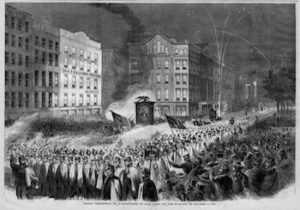
The Wide Awakes (white paramilitary group)
*On this date in 1876, a race riot happened in Indianapolis, Indiana, over voting rights.
Long after the 15th Amendment to the Constitution was ratified, many whites in Indiana continued to work against enfranchisement for Black citizens. Laws limiting the civil rights of African Americans were kept in the state constitution; in many towns and cities, Black voters were intimidated or physically assaulted. Intimidation of non-whites at the polls was common during the 19th century, carried out by such groups as a paramilitary unit known as The Wide Awakes (pictured above). The 1872 elections saw several such attacks; the 1876 elections in Indianapolis are where the worst recorded violence against Black citizens occurred.
May 3, 1876, was Election Day for Indianapolis city offices. As the day wore on, news began to spread in the city’s Black neighborhoods that Black voters were being physically attacked and assaulted at the voting stations in Ward Six. A group of Black citizens from the city’s fourth ward set out to investigate, and as they approached the voting site, police met them. Armed with wooden spokes manufactured by a neighborhood wheel company, police had arrived in the Fourth Ward and been joined by white residents of the neighborhood. The combined group converged on the black citizens and attacked them; several Blacks were injured, one man was stabbed, two or three were shot, and several were beaten. The man who had been stabbed later died from his wounds; there were no reports of injuries among the police or the white men present.
One Indianapolis newspaper reported that the voter suppression had been successful: “One man was knocked down and dragged out, and others kept aloof from the polls rather than incur the risks of meeting alike fate.” The next day, the Indiana Sentinel, Indianapolis News, and Indianapolis Journal carried stories about the events but produced conflicting testimonials about who had started the riot. The Sentinel laid all of the blame on the Blacks, claiming that they had arrived carrying bludgeons and describing them as “murderous” and “frenzied”; the same newspaper, in another story, declared that all Black voters were “slaves” of the Republican Party, turned “vicious” by their new masters.
Although several whites were arrested, all of the cases were dismissed. Incidents of intimidation of Black voters continued, although the violence of the Election Riot of 1876 was not repeated. It was not until 1881 that Article XIII of the 1851 state constitution, which denied nearly all rights to Blacks, was struck from that document.
The Trustees of Indiana University
1229 East Seventh Street
Bloomington, Indiana 47405